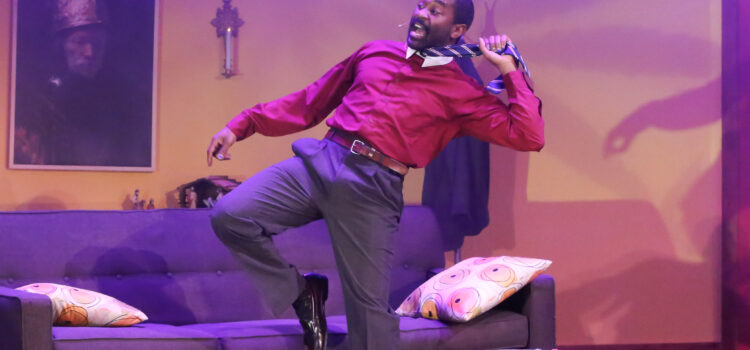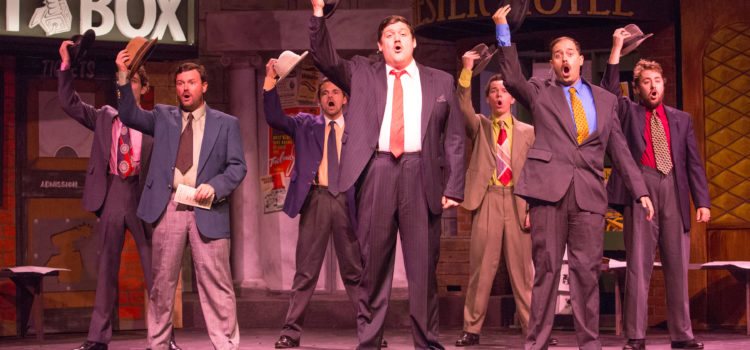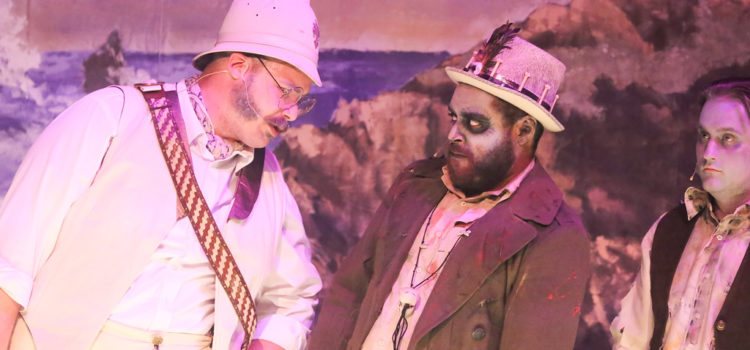By Lynn Venhaus
At first glance, the daffy “Jesus & Johnny Appleweed’s Holy Rollin’ Family Christmas” takes us back to the fuddy duddy ‘50s, with the on-stage stylings of TV sitcom land when dads ruled the roost and moms vacuumed wearing pearls.
But it’s far more subversive than that, and with the book, music and lyrics crafted by New Line Theatre’s Artistic Director and provocateur Scott Miller, would you expect anything different in an original stoner musical comedy with that ripe-for-parody title?
For New Line fans, this is rooted in previous shows — the world premiere of “Johnny Appleweed” in 2006, so it is a 17-years-in-the-making sequel, and the regional premiere of “Reefer Madness the Musical” in 2004.
Only now cannabis is legal in Missouri, and there are dispensaries on many corners of our fair city. Yet, we can recall a time when it wasn’t mainstream – and Cheech Marin and Tommy Chong made a fortune. So, this show is more impish than shocking.
(Although we do live in Missouri, and ‘family values’ legislators have significant agendas, so that leads to a forever “Twilight Zone” feeling. But back to our jolly neighborhood cul-de-sac with shiny, happy people).
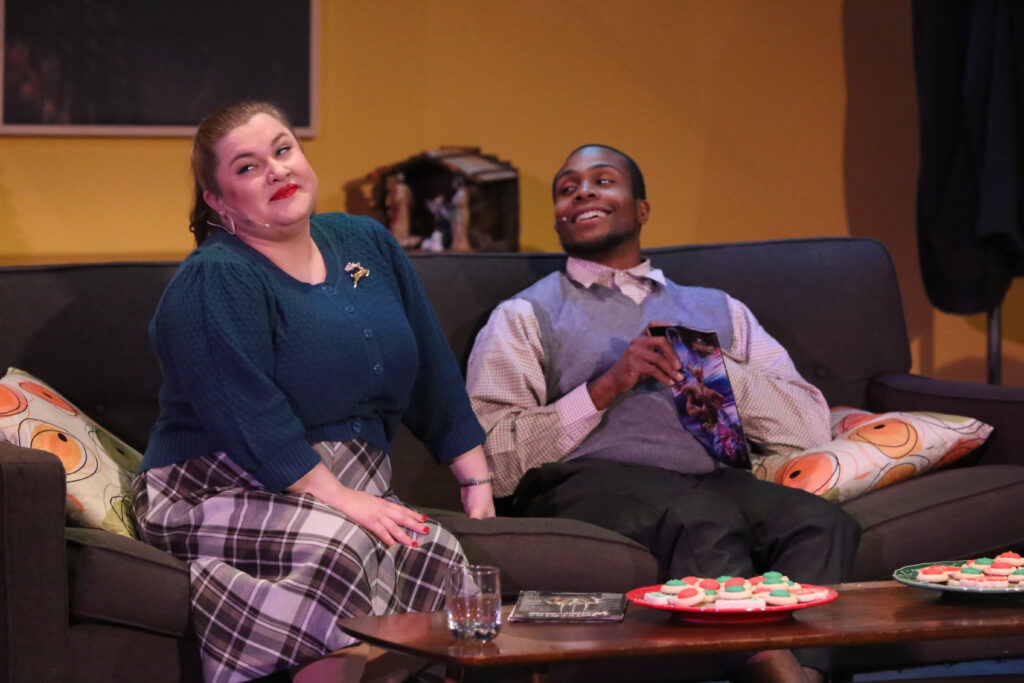
As a tongue-in-cheek response to the War on Drugs and the Culture Wars, Miller uses clever cultural references to make it clear how the bygone era, complete with hearty laugh-track type guffaws, was a white-bread wonderland where a middle-class suburban family has blinders on regarding diversity, inclusion, and sexual orientation.
For laughs, he’s mashed together the 1936 film “Reefer Madness” that was intended to scare straight those who may be tempted by the evil weed, Charles Dickens’ “A Christmas Carol,” and 1950s musical comedies (with intentional references).
This flip side of “The Donna Reed Show,” “Father Knows Best” and “Leave It to Beaver” has a cardigan-wearing curmudgeon of a dad named Harry Goodson whose family secrets revealed on Christmas Eve 1959 will rock his world – and he’ll be visited by ghosts overnight in the second act.
The family establishes how “Heteronormative” they are in their opening number, setting up the spoof of what passed for a normal, average family 60 years ago.
Terrell Thompson plays Harry as a cross between Archie Bunker, George Jefferson, and Ebeneezer Scrooge. He finds fault with everything, and his dialogue is a series of rants. It’s a hefty, albeit one-note, role for Thompson, a veteran of local musical theater. Musically, he is well-suited for ensemble work, but as the anchor, line delivery wasn’t as polished on opening night. (However, after more performances, I am hoping the cast is just zipping along by now).
Presumably, the brazen material demands an improv troupe feel to the ensemble, with nimble performers who have an affinity for Kids in the Hall and Second City-type sketches necessary to puncture holiday traditions and ramp up the laughs. Daughter Tammy discloses she is pregnant by her black boyfriend Miles, son Chip’s secret is that he’s gay and has a boyfriend named Dick, and brother, Uncle Hugh, is a cross-dresser with an infinity for a blow-up doll.

Whew! A National Enquirer panoply of scandalous behavior that could be a laugh riot if everyone’s all-in on an over-the-top satire — but not as effective if the tone is lopsided depending on performer’s slickness. Because the lyrics and lines have enough zingers to elicit plenty of snickers.
It could be that the actor who played Chip was replaced on opening night by Tony L. Marr Jr., the assistant director and choreographer. Marr assumed the role with noteworthy aplomb.
Because this resembles the audacious dark comedy material that John Waters and Charles Busch specialize in, it should not be startling that longtime theatrical sweetheart Kay Love plays typical housewife Bess Goodson as more naughty than nice. She’s infused the Christmas cookies with pot, and lets loose in a defiant, liberating solo.
You know you’re in a bizarro world when you hear Love sing “Hoo-Hoo of Steel” without flinching or blushing. She can shimmy better than your aunt’s Jell-O salad slipping out of a decorative mold.
Love’s poise and classically trained voice, and vivacious Marlee Wenski’s silky, sultry vocals stand out in their numbers. Wenski doubles as teen movie icon Sandra Dee (the original “Gidget”), having a bawdy time in the number “Don’t Look at Me, I’m Sandra Dee,” and parodies a rebellious version of a good saddle-shoe-wearing daughter in “Miles and Miles.”
An unfazed Tawaine Noah leans in as Uncle Hugh, who leads a not-so-secret life, singing “Mary Jane and Mary Jane,” and as unborn twin Jerry, who returns as a ghost.
Can they live in comfort and joy or will their variations from the norm tear apart the family? I was reminded of the classic 1990 “Saturday Night Live” sketch called “Dysfunctional Family Christmas” about a compilation album of songs mocking less than ideal family gatherings.
Cheeky song titles include “Love Doesn’t Suck with My D**k,” “Daddy’s Talking S**t,” and “That Stick Up Your Ass.”
Here, dear old dad might need a comeuppance – his deceased twin brother, Jesus Christ, Sandra Dee and explorer and pot enthusiast Johnny Appleweed are the ghosts who visit. They force him to come to terms with recreational drug use: “Have Another Toke and Have a Merry Christmas.”
The family drama is offset by a quartet of cheery carolers who deliver “The Elves Get Stoned,” “Better Living Through Chemistry” and “Man in the Gray Flannel Life.” Stephanie Merritt, Robert Doyle, Matt Hill, and Lauren Tenenbaum merrily roll along with setting the mid-century tableau.
Mallory Golden’s music direction is breezy, with a fine-tuned machine of John Gerdes on bass, Joseph Hendricks and Alex Macke on reeds, Brad Martin on percussion, and Adam Rugo on guitar (and she’s on keyboard).
Lauren Smith Beardon has outfitted the carolers in festive attire, and the Goodsons in typical suburban family looks, complete with housewife aprons for Love. Lighting designer (and technical director) Matt Stuckel has fun inserting cannabis plant imagery in shadows – I haven’t revisited “Reefer Madness” since my college days, but I believe there was a lot of shadows to signify danger – so touché.

As is customary, Rob Lippert’s scenic design is appropriate to the Mid-Century Modern décor of the period – and the height of sophistication with a retro artificial aluminum silver Christmas tree and the reflective color wheel, so tres chic back in the day. He has captured the tone and tenor of the show.
The vintage vibe is one of the most attractive qualities of the production. Miller has managed to include an impressive litany of every pop culture reference significant to the era – and even obscure little nuggets to prod recognition. Commendable wordplay, indeed.
Since founding New Line Theatre in 1991, he has written 11 musicals and two plays, including a rollicking “The Zombies of Penzance” in 2018. His penchant for irreverent theater and socially relevant material has served him well.
This show is basically a fun romp with some jabs on social mores, featuring stand-out performances by several spirited women. In days of yore, when Ladies’ Home Journal arrived in the mail, “The Ed Sullivan Show” was tuned in to every Sunday, and you might have had to make do with a TV dinner if mom was hosting her Bridge Club, everyone would have made a fuss over the “sassy lassies.”
A few nips and tucks, and more collaborative run-throughs, and “Jesus and Johnny Appleweed’s Holy Rollin’ Family Christmas” may be just the antidote to Hallmark movie marathons and wholesome holiday setlists on repeat. With Bess’s special-recipe brownies, it could be one of the hap-hap-happiest Christmas’ since Bing Crosby tap-danced with Danny Kaye.
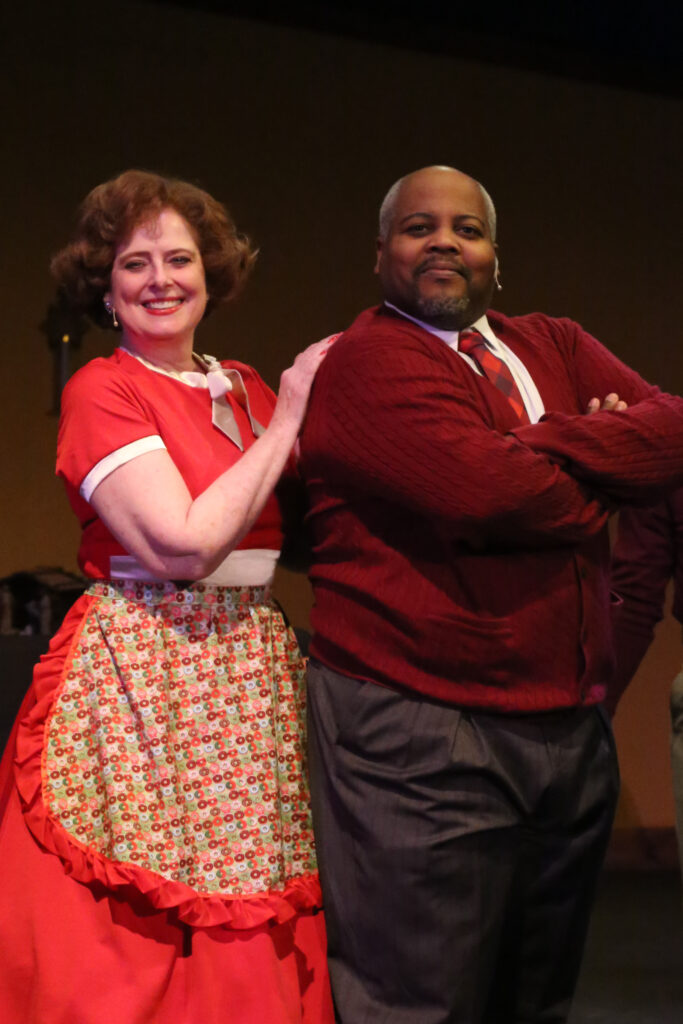
New Line Theatre presents the world premiere musical “Jesus and Johnny Appleweed’s Holy Rollin’ Family Christmas” from Dec. 1 to Dec. 16, with performances Thursday, Friday, and Saturday at 8 p.m. at The Grandel Theatre, 3610 Grandel Square. For other information, visit New Line Theatre’s full-service website at www.newlinetheatre.com.
Tickets are $35 for adults and $30 for students/seniors/To charge tickets by phone, call MetroTix at 314-534-1111 or visit the Fox Theatre box office or the MetroTix website.
Discounts are available. Any high school student with a valid school ID can get a $10 ticket for any performance, with the code word, posted only on New Line’s Facebook page.
Ten free seats for every performance, open to any college student with a valid student ID.
New Line offers all currently employed educators half-price tickets on any Thursday night, with work ID or other proof of employment.
New Line offers all active-duty military personnel half-price tickets on any Thursday night, with ID or other proof of active-duty status.
All offers not valid in connection with other discounts or offers, available only at the door, and subject to availability.

Lynn (Zipfel) Venhaus has had a continuous byline in St. Louis metro region publications since 1978. She writes features and news for Belleville News-Democrat and contributes to St. Louis magazine and other publications.
She is a Rotten Tomatoes-approved film critic, currently reviews films for Webster-Kirkwood Times and KTRS Radio, covers entertainment for PopLifeSTL.com and co-hosts podcast PopLifeSTL.com…Presents.
She is a member of Critics Choice Association, where she serves on the women’s and marketing committees; Alliance of Women Film Journalists; and on the board of the St. Louis Film Critics Association. She is a founding and board member of the St. Louis Theater Circle.
She is retired from teaching journalism/media as an adjunct college instructor.

